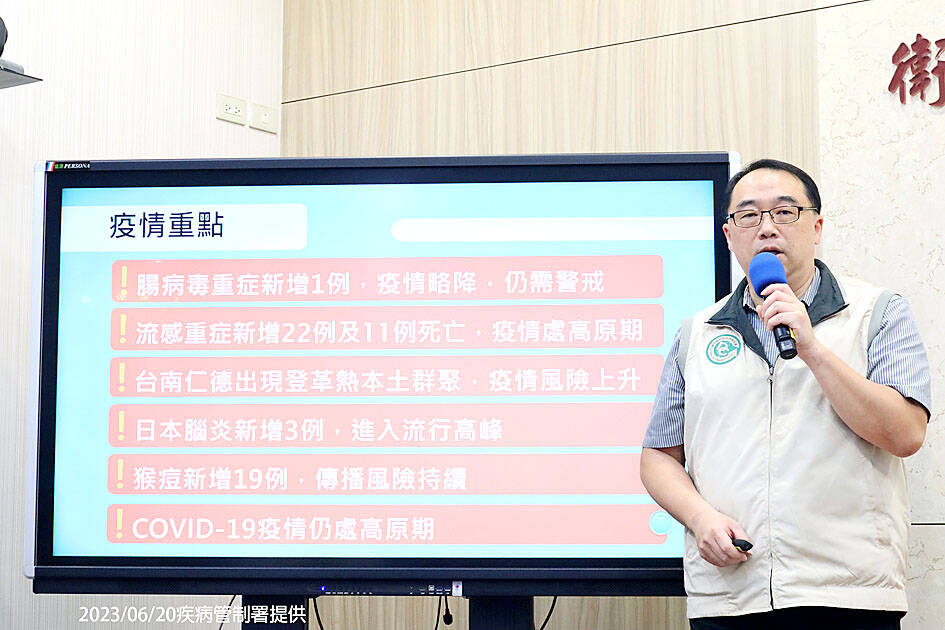The Centers for Disease Control (CDC) yesterday reported the nation’s first female mpox case — a woman in her 90s — as well as 22 new cases of severe flu complications and 11 flu-related deaths.
CDC Epidemic Intelligence Center Director Guo Hung-wei (郭宏偉) said that 19 new cases of mpox — 18 local and one imported — were confirmed last week.
The oldest is a woman in her 90s, who developed rashes on her torso and limbs on June 1, and sought emergency treatment for a fever and other symptoms on Thursday, he said.

Photo courtesy of the Centers for Disease Control
She tested positive for mpox on Saturday, Guo said, adding that the source of infection was unknown.
CDC Deputy Director-General Philip Lo (羅一鈞) said that the woman is a long-term bedridden patient, who was hospitalized in the middle of or late last month.
She developed rashes shortly after returning home, but so far, tests on her family members and caregivers all returned negative, Lo added.
It is Taiwan’s first reported female case of mpox infection, implying that there might be unreported cases of mpox in local communities, so people who are at a higher risk of infection are advised to get vaccinated, he said.
From June 23 last year to Monday, Taiwan had a total of 181 mpox cases — 168 local and 13 imported — 123 of whom had recovered, six were still in hospital and 52 were at home practicing self-health management, CDC data showed.
Lo said that mpox, flu, enterovirus, COVID-19, dengue fever and Japanese encephalitis infections were either at a peak or plateau.
Guo said that 79,366 hospital visits for flu-like illness, 22 serious flu complications and 11 flu-related deaths were reported last week, and the main circulating virus strains were influenza A (H1N1) and influenza A (H3N2).
Among the 11 deaths from mpox, all had underlying health conditions and developed pneumonia after contracting the flu, CDC physician Lin Yung-ching (林詠青) said, adding that eight of them had not been vaccinated.
Lin also advised guardians or caregivers to monitor high-risk people, including young children and elderly people, for signs of severe complications after infection.
From Oct. 1 last year to Monday, a total of 294 severe flu cases were reported — including 154 cases of influenza A (H1N1) and 132 cases of influenza A (H3N2) — and 53 deaths were confirmed, CDC data showed.
There were 12,633 hospital visits for enterovirus infections, 4.8 percent lower than the week before, but still higher than the epidemic threshold, Guo said.
That means the local outbreak is still at a plateau, with the Coxsackie A virus being the main circulating strain, he said.
Guo said that 16 new cases of dengue fever, all in Tainan, and three new cases of Japanese encephalitis, two in Kaohsiung and one in Tainan, were reported last week.
The two diseases are transmitted by mosquitoes, so people are advised to take preventive measures against mosquito bites, especially when going on outings during the upcoming long weekend.
The CDC also reported an average of 253 new hospitalized cases of COVID-19 for last week, up 3 percent from the previous week, suggesting that the local outbreak was at a plateau.
The CDC added that according to a recommendation made at a specialists’ meeting on June 6, hospitalized COVID-19 patients no longer have to be placed under mandatory isolation, unless their doctor deems it necessary, such as if the patient is unwilling to cooperate with the hospital’s infection control measures.

The Central Weather Administration (CWA) today issued a "tsunami watch" alert after a magnitude 8.7 earthquake struck off the Kamchatka Peninsula in northeastern Russia earlier in the morning. The quake struck off the east coast of the Kamchatka Peninsula at 7:25am (Taiwan time) at a depth of about 19km, the CWA said, citing figures from the Pacific Tsunami Warning Center. The CWA's Seismological Center said preliminary assessments indicate that a tsunami could reach Taiwan's coastal areas by 1:18pm today. The CWA urged residents along the coast to stay alert and take necessary precautions as waves as high as 1m could hit the southeastern

The National Museum of Taiwan Literature is next month to hold an exhibition in Osaka, Japan, showcasing the rich and unique history of Taiwanese folklore and literature. The exhibition, which is to run from Aug. 10 to Aug. 20 at the city’s Central Public Hall, is part of the “We Taiwan” at Expo 2025 series, highlighting Taiwan’s cultural ties with the international community, National Museum of Taiwan Literature director Chen Ying-fang (陳瑩芳) said. Folklore and literature, among Taiwan’s richest cultural heritages, naturally deserve a central place in the global dialogue, Chen said. Taiwan’s folklore would be immediately apparent at the entrance of the

Speeding and badly maintained roads were the main causes of a school bus accident on a rainy day in Taipei last year that severely injured two people and left 22 with minor injuries, the Taiwan Transportation and Safety Board said. On March 11 last year, a Kang Chiao International School bus overturned inside the Wenshan Tunnel (文山隧道) on the northbound lane of the Xinyi Expressway. The tour bus, owned by Long Lai Co, exceeded the speed limit after entering the tunnel, the board’s investigation found. Sensing that the rear of the vehicle was swaying, the driver attempted to use the service and exhaust

“China is preparing to invade Taiwan,” Deputy Minister of Foreign Affairs Francois Wu (吳志中) said in an exclusive interview with British media channel Sky News for a special report titled, “Is Taiwan ready for a Chinese invasion?” the Ministry of Foreign Affairs said today in a statement. The 25-minute-long special report by Helen Ann-Smith released yesterday saw Sky News travel to Penghu, Taoyuan and Taipei to discuss the possibility of a Chinese invasion and how Taiwan is preparing for an attack. The film observed emergency response drills, interviewed baseball fans at the Taipei Dome on their views of US President